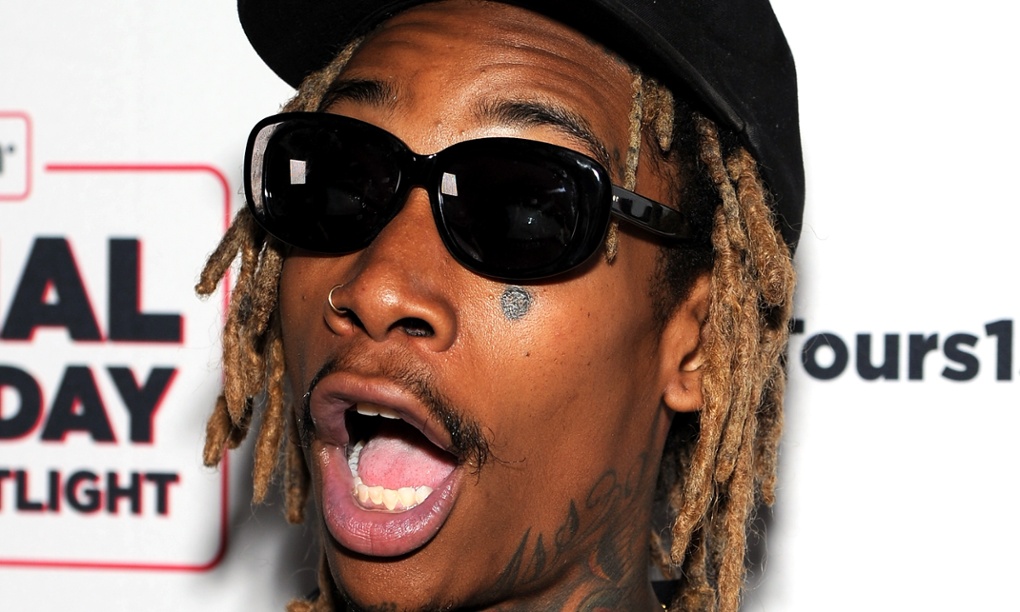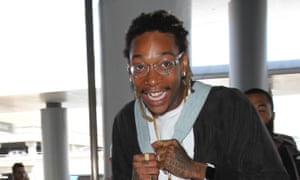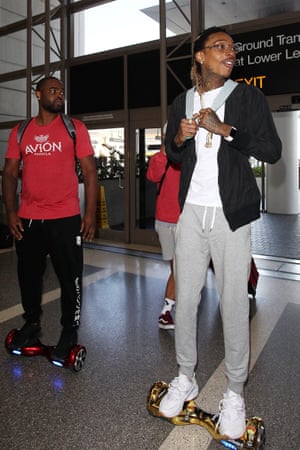
Wiz Khalifa: toast of the tabloids. Photograph: Andrew Toth/FilmMagic
Wiz Khalifa has had the No 1 song in America for four weeks running, See You Again. A tribute to Paul Walker from the Furious 7 soundtrack, it’s a massive hit, topping charts around the world. It’s easily the biggest thing Khalifa has been a part of, probably the most-spun hip-hop track since The Monster by Eminem and Rihanna, which was also No 1 for four weeks, in late 2013 and early 2014.
But that doesn’t mean See You Again is any good. Featuring a falsetto hook sung by a diminutive, chubby-cheeked youngster named Charlie Puth, it has a distinctly Lite FM flavor, the kind of thing you might hear while picking up your allergy medicine at CVS.
In any case, the track has pushed Wiz Khalifa into the top echelon of rap superstars, and at only 27. He’s run up a long string of gold and platinum singles, and though he doesn’t pass the “rapper your mother has heard of” test, that’s probably not far off. But his ascent has been unlikely: he’s a stick-thin military brat from Pittsburgh, who slowly built his career over the course of a decade. He won over his city with early mixtapes like 2006’s Show and Prove, which is highlighted by Pittsburgh Sound, on which he raps fast and nimbly. His underground following swelled largely on the basis of songs about smoking weed, like Flight School. (He gets as high as an airplane, you know?)
For a while he didn’t really need the mainstream. His fan base wasn’t huge, but it was passionate enough to keep him in Converse and marijuana – he claimed to spend $10,000 a month on weed at one point. His breakout came in 2010 with the explosion of his songBlack and Yellow, which sold 3m copies. It was an inspiring hometown anthem (waaay better than Empire State of Mind) that shouted out the Pirates, Penguins, and Steelers’ team colours, as the latter surged to the Super Bowl. It also had a quick tempo, though many of his later hits wouldn’t.
By this point he had signed with Atlantic records, home of big-name rappers like Lupe Fiasco and BoB, and also Bruno Mars. Atlantic relied on a formula: radio-friendly raps buffered by giant sung hooks. Not everyone liked this approach(Lupe Fiasco famously denounced some of his own songs), but it was undeniably successful, and Khalifa had hits with slower-paced tracks like No Sleep, When I’m Gone, Remember You and Young, Wild & Free, with Mars and Snoop Dogg.
Snoop has grumbled that Khalifa borrowed heavily from his sonic template. “I guess the old school version would have been for me to ‘smash’ him [because of the similarities],” Snoop told me in 2013. “[But] my heart was to love him, because I loved what he did, and he was an extension of what I had put out.”
Khalifa’s latest album Blacc Hollywood is a lumbering, big-budget collection of hip-hop cliches about women, the club, and getting high, with a motivational tone. By the time of its release last August, Khalifa’s tatted-up face had become a tabloid mainstay, considering he’d moved to Los Angeles, and married and had a son with Kanye’s ex Amber Rose. This notoriety, combined with the fact that he was rapping slower and more deliberately – he sounds completely different than early in his career – has helped him secure his perch atop the rap pile.
Thus, we got See You Again, which is disappointing not because it doesn’t talk about smoking one down in Walker’s memory, but because it’s full of vague platitudes (“That bond will never be broken/ The love will never get lost,” etc) Also, the saccharine chorus makes me want to commit genocide. But apparently that’s what people want, as the song broke Spotify’s record for most streams in a day, some 4.2m. It’s a cliche to pine for an artist’s younger, hungrier days before they had every comfort in life. But as far as I’m concerned, Khalifa’s Pittsburgh incarnation was much more appealing than his Hollywood one.

